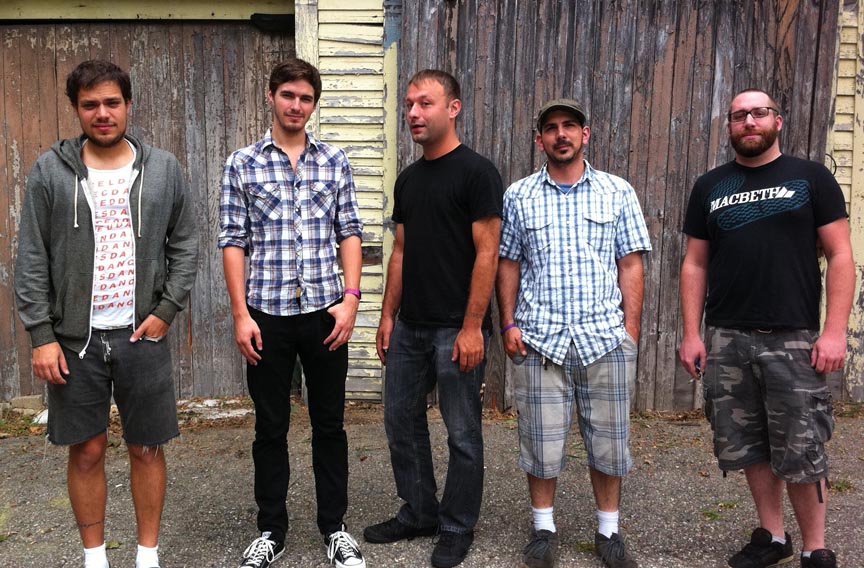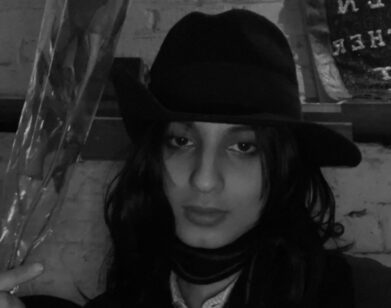Bomb the Music Industry Goes Off

ABOVE: BOMB THE MUSIC INDUSTRY
Internet-age success stories tend to share a common thread—they bridge a gap between human beings created in part by the Internet itself. During a time when file-sharing made it difficult for bands to profit from their music, new recording technology made it possible for Jeff Rosenstock to create a record titled Album Minus Band. It was the first chapter in the story of a project called Bomb The Music Industry—a story that will conclude on Sunday, January 19.
In 2005, In Rainbows was released for free on the Internet. Last year, Jay Z released his first free-to-download album. Meanwhile, Brooklyn’s Bomb The Music Industry has been releasing its music for free all along, predating early adopters like Radiohead and Nine Inch Nails—and Rosenstock took it a few steps further. Since the inception of the Bomb the Music Industry project, fans were encouraged to bring blank CDs or plain T-shirts to its affiliated live shows, where they could have a Bomb The Music Industry CD burned or T-shirt spray-painted for them on the spot. Hell, you could even bring an instrument, learn a few chords, and actually be in Bomb the Music Industry—all for free.
By eliminating the financial ties behind the exchange of music, Rosenstock created a kind of human bond with his fans that simply no longer exists in the digital age, something that a thousand Reddit AMA and Twitter giveaways couldn’t emulate. This Sunday, Bomb The Music will play its last show. Tickets sold out in under an hour. If it’s anything like past Bomb the Music Industry shows, fans will sweat and scream. They will sing along and lavish in the energy of something built rather than observed. They will create for the fans what a thousand publicists and tour managers couldn’t—an experience rather than performance, a scene rather than a spectacle. In 2014, when the word “punk” has been obscured beyond any recognizable indicator style or sound, maybe Bomb the Music Industry has re-defined it into something new, something that represents the kind of unbridled enthusiasm that can’t be bought or sold, only shared.
JONATHAN REISS: Tell me the story of how Bomb The Music Industry began. Why did you decide to make everything free?
JEFF ROSENSTOCK: I was in a band called The Arrogant Sons of Bitches for a while. During one of our tours, I started to get sick of the merchandising aspect of things. I felt it was getting in the way of writing songs. I told the band I didn’t want to sell merch anymore, which they thought was crazy. So, we took a break. During that time, I recorded a song on my computer while staying at my parents’ house in between stages of being an actual adult human. I just recorded it in my bedroom, put it on the Internet, called it Bomb The Music Industry, and people liked it. Since I just made it myself on a laptop, it made sense to me to put it out for free. Also, every other band’s music was on the Internet for free whether they wanted it to be or not. Soon we took it further and said anyone who wanted to a Bomb the Music Industry shirt could bring a shirt; we’d make it for free. The idea was we didn’t ever want anyone to feel like they were being forced to purchase something. It kept growing, so we kept doing it.
REISS: As for your first band, did merchandising really get in the way, or were you just being a quixotic punker?
ROSENSTOCK: I think the climate has changed since that first band. There was more emphasis on merch back then, more shirts and things like that. With Bomb, I was never trying to tell people what they should or shouldn’t do. I’m more open-minded about it now. I think that it can work for some people. But the way we did Bomb the Music Industry just worked better for me.
REISS: Bomb the Music Industry’s first record came out before Radiohead and Nine Inch Nails released donation-optional albums. Were you surprised to see mainstream bands begin to release their music for free, or did it just validate what you’d known all along?
ROSENSTOCK: I remember very specifically being in the van on tour for our fourth album, Get Warmer, and I was sick with the flu sleeping in the back. I woke up from a fever dream and saw a text from a friend saying that Radiohead was putting out In Rainbows for free. I remember just thinking, “Okay, so what I’m doing is completely obsolete.”
REISS: Is being a band that only profits from live shows a viable option? Does it have anything to do with why the band calling it quits?
ROSENSTOCK: No, it has absolutely nothing to do with why we are not doing it anymore. I think looking at as, “Bands that release their music for free online only make their money from playing live,” is not seeing the full picture. Maybe the dollars specifically come from shows, but people are coming to the shows because they heard the songs, they heard the songs because they are free on the Internet. It all builds into the same thing.
REISS: Your live shows have such a palpable energy. It’s the kind of thing you rarely see anymore, especially in New York. Do you think that has anything to do with the fact that you’re not always asking your fans for money?
ROSENSTOCK: I think a lot why our lives shows are good is because of the crowd, and because of the energy that they bring. Also, there was a time when a lot of the people that came to our shows were a bunch of drunk bros. At a certain point, we decided we were going to start calling them out. We also decided to become more gay-positive and feminist and all that stuff, and that we were going to be really vocal about it. After that, our crowd became a lot friendlier, and honestly a lot more fun.
As far the financial stuff, when we started out, I thought it was important that the music be available online for free with the lyrics and stuff accessible to anyone who wanted it. Bands now are always trying to make their presence known through social networking and whatnot, but that’s just the same as bands before the Internet age trying to connect with fans in some other way. I was actually on a panel about interacting with fans and a lot of pretty renowned people were talking about stuff like following people on Facebook to get fans. But I was like, I don’t follow people on Facebook, I think that’s creepy. I wouldn’t want them following me on Facebook. I don’t even have a mailing list.
REISS: Your fans tend to also feel a real connection to you personally. It’s something you share in common with bands like Andrew Jackson Jihad and Against Me!. You’re perceived as approachable and affable. To fans you’re more like an accessible friend than some remote idol.
ROSENSTOCK: I think me, Sean Bonnette and Laura Jane Grace, and a lot of the bands people feel that way about, we’re just really honest in our lyrics. I think we got really lucky in that the right kind of people who would appreciate that heard us at the right time, because there are plenty of people that are honest in their lyrics. But if someone comes up to me at a show and talks to me, if they’re not freaking out about meeting me, which I’m just not very good at dealing with, of course I’ll talk to them. I’m mean, they’re a person. I’m not a monster. It may sound like bullshit humility, but I’m just a dude making music. I’d be doing this if no one was listening.
REISS: There’s always been a certain aspect of Bomb that doesn’t take itself too seriously. Maybe that’s just a facet of your personality. But there are moments of deep emotion and melancholy on your records. Does it ever feel limiting to you, avoiding seriousness?
ROSENSTOCK: I feel like it did a bit. In between Goodbye Cool World and Get Warmer, and definitely in between Scrambles and Vacation, but I think in both those instances we went ahead and took drastic steps away from that direction on the next albums and we were lucky in that people were receptive to it. We were lucky that to have people that listened who were really open-minded, so in the end it really wasn’t limiting.
REISS: Why has the band decided to break up?
ROSENSTOCK: I don’t really know the answer to that, to be honest. Matt moved to Australia, and even though we started with a constantly revolving group of band members in the beginning, we’ve had a pretty fixed lineup for the past few years. So instead of just being a band that’s constantly replacing members, we figured we’d done all of the stuff we wanted to do. It seemed to make sense to see if we could live our lives without the band.
REISS: Would you do it all again if you could? Would you change anything?
ROSENSTOCK: I’m happy with the way everything turned out. Even the mistakes we’ve made I wouldn’t take back because they ended up yielding something good. Like we started playing all $10 all-ages shows because we’d been playing a bunch of support tours with mostly 18- or 21-and-up shows, and it wasn’t really fun.
We’ve done exactly what we’ve wanted. We never compromised to anyone and still managed to have a successful thing. I don’t take that lightly. Yeah, we’re really lucky to have had that.
BOMB THE MUSIC INDUSTRY WILL PLAY ITS FINAL SHOW AT WARSAW IN BROOKLYN THIS SUNDAY, JANUARY 19. TO DOWNLOAD THE BAND’S MUSIC FOR FREE, VISIT ITS WEBSITE.






